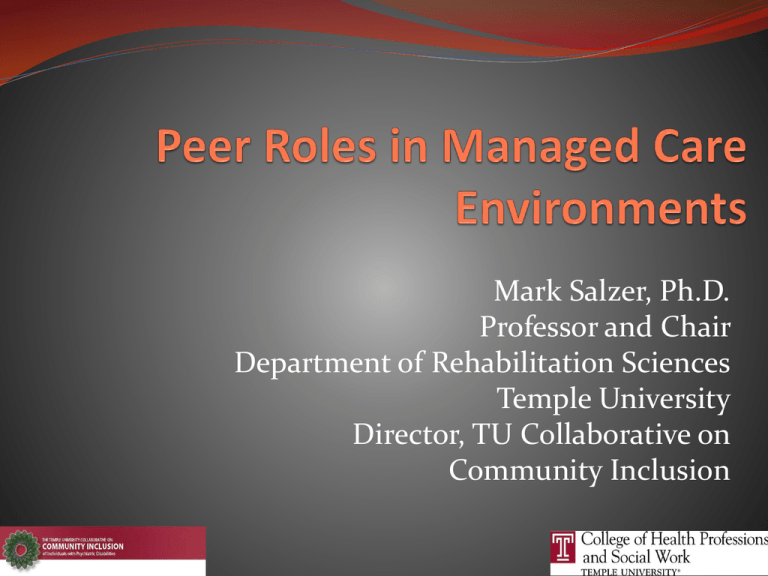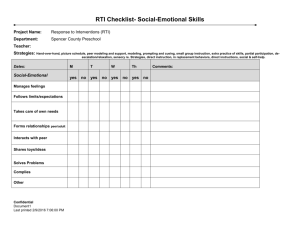Department of Rehabilitation Sciences
advertisement

Mark Salzer, Ph.D. Professor and Chair Department of Rehabilitation Sciences Temple University Director, TU Collaborative on Community Inclusion GROW Residence Kankakee, IL. Federal Recognition of Peer Support…Increasingly Viewed As A “Medical Necessity” 1978: President Carter’s Commission on Mental Health offered early federal recognition that “groups composed of individuals with mental or emotional problems” were being formed around the country 1987: Surgeon General’s Report recommended strategies for promoting self-help groups 1999: Surgeon General’s Report promotes self-help groups and consumerrun services Pre-2001: Peer support services funded by states and counties 2001: CMS Funding of Peer Support in GA and AZ 2003: The President's New Freedom Commission on Mental Health promotes consumer-operated services 2004: VA strategic plan agenda recommendation “Hire veterans as Peer/Mental Health Para Professionals.” (Commission Rec. 2-3.18 &19, Appendix 1). 2007: CMS guidance letter to states on peer support services 2008: Handbook on Uniform Mental Health Services in VA Medical Centers and Clinics states that “all veterans with SMI [serious mental illnesses] must have access to Peer Support (2, pg. 28)”. http://www.pewtrusts.org/~/media/legacy/uploadedima ges/pcs_assets/stateline_photos/2013/09/0911topstoryviz png.png Daniels, A., Grant, E., Filson, B., Powell, I., Fricks, L., Goodale, L. (Ed), Pillars of Peer Support: Transforming Mental Health Systems of Care Through Peer Support Services, www.pillarsofpeersupport.org; January, 2010. What Are Peer Specialists Doing? % Time Groups % Time Individuals Average Across All Programs 25% 48% Case Management 15% 61% Partial Hospital/Day Program, Inpatient, or CRISIS 38% 43% VR or Clubhouse 32% 47% Therapeutic Recreation or Psych. Rehab. 36% 44% Residential 4% 75% Drop-In Center 41% 37% Education/Advocacy 27% 26% Independent Peer Support Program 22% 51% Other/Could not be Coded 22% 38% Program Salzer, M.S., Schwenk, E., & Brusilovskiy, E. (2010). Certified Peer Specialist Roles and Activities: Results from a National Survey. Psychiatric Services, 61, 520-523. Whole Health Action Management (WHAM) Promote resiliency, wellness, and self-management of health and behavioral health Basic Elements Teach skills to enhance self-management WHAM peer support groups Weekly action plans to create new health habits Recovery Coaching to Promote “Personal Medicine” “Personal medicine”: self-taught, nonpharmaceutical strategies that persons with mental illnesses use, often in combination with psychiatric medication, to advance their recovery and improve their lives. Example: a man with bipolar disorder who used math problems to help himself get to sleep and thus avoid a manic episode “There seem to be as many types of personal medicine as there are individuals: fishing, parenting, repairing airplanes, walking, diet, caring for pets, friendship, driving...” (Deegan, 2007, p. 65). Deegan, P. E. (2007). The lived experience of using psychiatric medication in the recovery process and a shared decision-making program to support it. Psychiatric Rehabilitation Journal, 31(1): 62-69. Pennsylvania SDC Demonstration Magellan Health Services Office of Behavioral Health, Delaware County, Pennsylvania (In coordination with PA OMHSAS) Temple University Collaborative on Community Inclusion of People with Psychiatric Disabilities Mental Health Association of Southeastern Pennsylvania Recovery Coach Activities Budget coaching Exploring dreams to develop life goals Setting budget from goal activities Obtaining authorization for purchases A total of 507 asks from 35 people Examples Gym memberships Items for weight loss Computer Work clothes Attending leisure events Engagement Specialist Strongest evidence showing peer support benefits Peers can… Combat demoralization by offering hope Decrease self-stigma Enhance self-advocacy and choice




